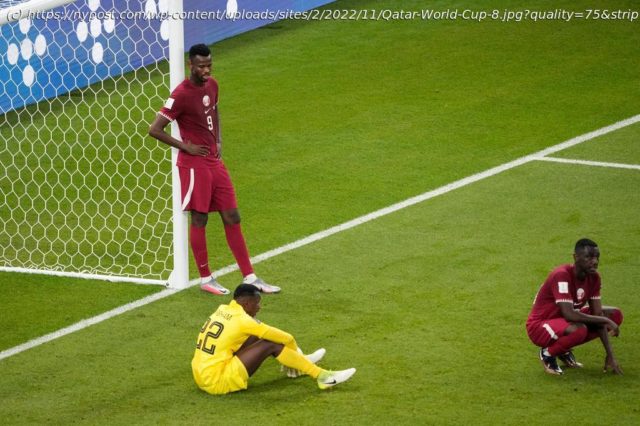Array
The gilded stadiums are among the most spectacular in the world. The seafront is sparkling and the skyscrapers are draped with larger-than-life banners featuring the stars of the World Cup.
Fans crowd around big screens throughout the city to watch soccer along the waterfront in Doha, or at the upscale Pearl Marina. Streets are canopied by the national flags of the 32 teams playing in this year’s World Cup, and restaurants are packed. So is the fan zone, where Colombian singer Maluma performed on the eve of the opening game.
The only thing missing is a winning team.
Qatar became the first host nation in World Cup history to lose the opening match, and then only the second host to be eliminated from the group stage. South Africa in 2010 was the first to be eliminated in group stage but still had a chance to advance in its third and final group match.
Not Qatar. This time the host was eliminated after just two games — a 2-0 loss to Ecuador in the World Cup opener, then a 3-1 loss to Senegal — to make Tuesday’s match against the Netherlands meaningless for the Qataris.
A total flop?
Qatar coach Felix Sanchez says absolutely not.
“I think these players have achieved a great deal over the last years. Now we need to be aware that to compete at this level, we are still lagging behind,” Sanchez said the day before Qatar’s final match. “I think if we work at this on a daily basis, gradually we will be closer to this level.
“I don’t feel disappointed or embarrassed,” Sanchez continued. “The World Cup is the most demanding competition, and only a few can be here. We are still slightly behind. The country will continue working so that the next time Qatar comes to a World Cup — hopefully soon — we’ll be able to compete better than we did this time.”
Qatar spent at least $200 billion on the infrastructure required to host the global soccer tournament. There’s no known figure on what it spent to build an actual team, an endeavor in which Qatar had 12 years to scout prospects, develop talent, and assemble a squad capable of competing against the best in the world.
The final 26 selected indeed includes 16 Qatar-born players. But the first-ever goal for Qatar at the World Cup was scored by Mohammed Muntari, who was born in Ghana, and the roster includes players born in Algeria, Bahrain, Egypt, France, Iraq and Sudan.
In preparation for the World Cup, Qatar wooed other confederations to play against its team in an effort to improve. The team received guest entries into the South American and CONCACAF championships, and played friendlies that were loosely attached to qualifying for the 2020 European Championship.






